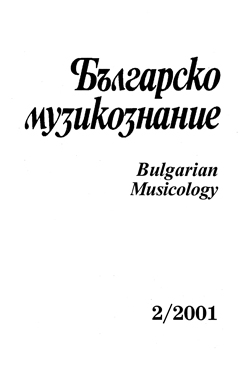Игра с повторението: за креативното в популярната музика/култура
Playing on Repetitive: creativity in popular music/culture
Author(s): Claire LevySubject(s): Music
Published by: Институт за изследване на изкуствата, Българска академия на науките
Summary/Abstract: Though already acknowledged in modern humanities as ‘music that matters’, contemporary popular music is often studied mostly on the ground of its extra-musical rather than on its intra-musical qualities. Usually, such a neglecting is a result of the still prevailing attitude among scholars (especially in musicology) who - even ready to appreciate popular music’s social significance - note the inferiority of the ‘music itself’ and reproduce in fact a mis/wrong-understanding of the specific logic, tools, priorities, meanings and values, articulated in popular music practices. This paper aims to identify a concept, hopefully applicable in distinguishing and understanding popular music ‘as both music and culture, which I name metaphorically playing on repetitive. Employing the concept of the ‘changing same’ (Gilroy 1993), I am going further to outline specific, priority aesthetic attitudes shifting the ideas of artistic complexity and creativity in major 20th century music practices which favor - in general, and in one by no means historically accelerated way - the repetition. The discussion is based around reflections on the music-narrative vs. the music process, the repetitive vs. the shocking new, the communication vs. the alienation, the signifying and the playing as a from of resistance. In addition to the obvious impact of African and African-American derived practices giving priority to the category of repetition, I consider as well the parallel fuel for such aesthetic shifts coming both from other ‘marginal’, traditional or ethnic minorities music practices and from innovative technological flow, outlining, after all, an Alternative to Modernity rooted in the European Enlightenment. The Alternative is seen as stimulating folk-like, neosyncretic cultural forms, based on the repetitive rather than the shocking innovation, the playing rather than the fixed opus, the conventional rather than the autonomous, the circular rather than the linear, the dialogical rather than the monological, the shared performing and participation rather than the alienated music making, the intertextuality rather than the single textuality, the passing temporality rather than the idea of eternal universality, etc. While being aware of the limitations of one only concept in distinguishing the peculiarities in the: variety of popular music styles, the discussion on the playing on repetitive would give possible insights into basic artistic approaches shaping the specific creativity observed in dominant 20th century popular music styles.
Journal: Българско музикознание
- Issue Year: 2001
- Issue No: 2
- Page Range: 55-66
- Page Count: 12
- Content File-PDF

